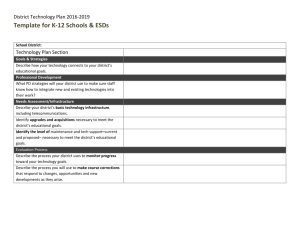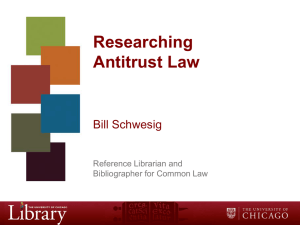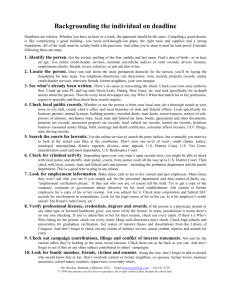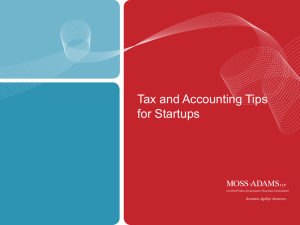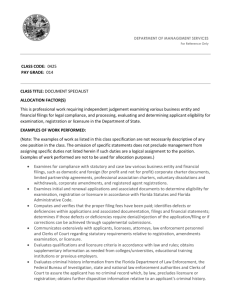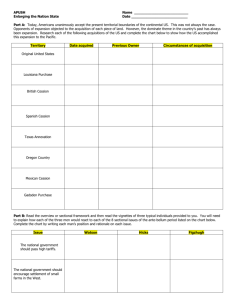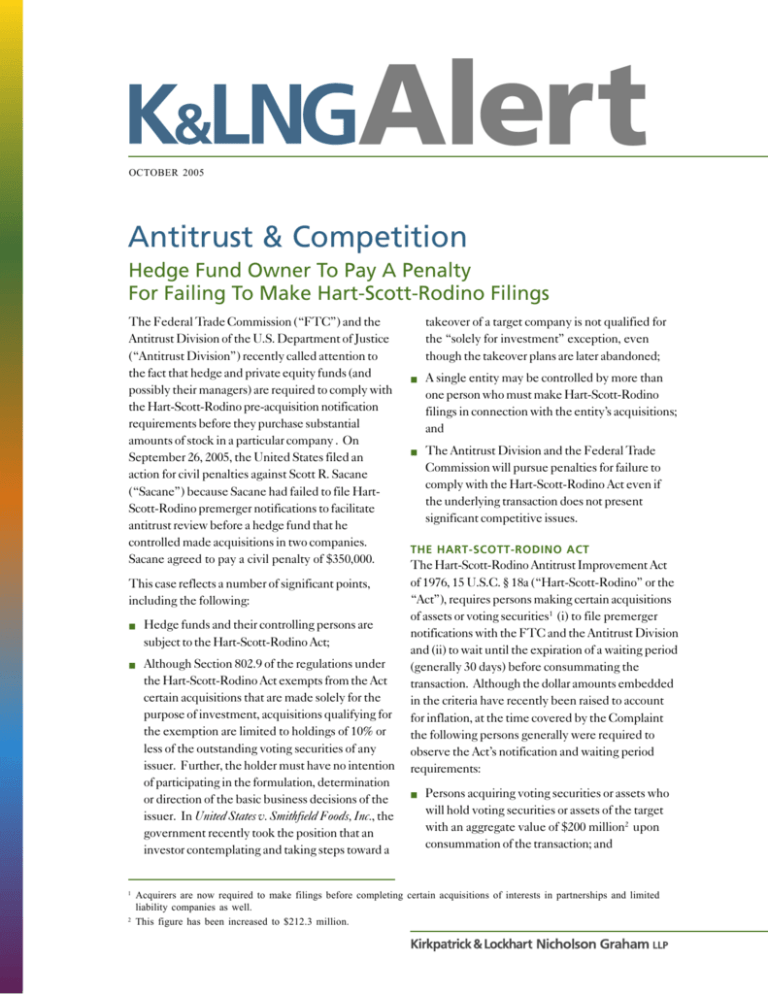
OCTOBER 2005
Antitrust & Competition
Hedge Fund Owner To Pay A Penalty
For Failing To Make Hart-Scott-Rodino Filings
The Federal Trade Commission (“FTC”) and the
Antitrust Division of the U.S. Department of Justice
(“Antitrust Division”) recently called attention to
the fact that hedge and private equity funds (and
possibly their managers) are required to comply with
the Hart-Scott-Rodino pre-acquisition notification
requirements before they purchase substantial
amounts of stock in a particular company . On
September 26, 2005, the United States filed an
action for civil penalties against Scott R. Sacane
(“Sacane”) because Sacane had failed to file HartScott-Rodino premerger notifications to facilitate
antitrust review before a hedge fund that he
controlled made acquisitions in two companies.
Sacane agreed to pay a civil penalty of $350,000.
This case reflects a number of significant points,
including the following:
■
Hedge funds and their controlling persons are
subject to the Hart-Scott-Rodino Act;
■
Although Section 802.9 of the regulations under
the Hart-Scott-Rodino Act exempts from the Act
certain acquisitions that are made solely for the
purpose of investment, acquisitions qualifying for
the exemption are limited to holdings of 10% or
less of the outstanding voting securities of any
issuer. Further, the holder must have no intention
of participating in the formulation, determination
or direction of the basic business decisions of the
issuer. In United States v. Smithfield Foods, Inc., the
government recently took the position that an
investor contemplating and taking steps toward a
1
2
takeover of a target company is not qualified for
the “solely for investment” exception, even
though the takeover plans are later abandoned;
■
A single entity may be controlled by more than
one person who must make Hart-Scott-Rodino
filings in connection with the entity’s acquisitions;
and
■
The Antitrust Division and the Federal Trade
Commission will pursue penalties for failure to
comply with the Hart-Scott-Rodino Act even if
the underlying transaction does not present
significant competitive issues.
THE HART-SCOTT-RODINO ACT
The Hart-Scott-Rodino Antitrust Improvement Act
of 1976, 15 U.S.C. § 18a (“Hart-Scott-Rodino” or the
“Act”), requires persons making certain acquisitions
of assets or voting securities1 (i) to file premerger
notifications with the FTC and the Antitrust Division
and (ii) to wait until the expiration of a waiting period
(generally 30 days) before consummating the
transaction. Although the dollar amounts embedded
in the criteria have recently been raised to account
for inflation, at the time covered by the Complaint
the following persons generally were required to
observe the Act’s notification and waiting period
requirements:
■
Persons acquiring voting securities or assets who
will hold voting securities or assets of the target
with an aggregate value of $200 million2 upon
consummation of the transaction; and
Acquirers are now required to make filings before completing certain acquisitions of interests in partnerships and limited
liability companies as well.
This figure has been increased to $212.3 million.
■
Persons acquiring voting securities or assets who
will hold voting securities or assets of the target
with an aggregate value in excess of $50 million3
but not more than $200 million, provided that
either the acquiring or the acquired person had
sales or assets of $100 million4 or more and the
other person in the transaction had sales or assets
in excess of $10 million.5
A person for Hart-Scott-Rodino purposes includes
any entity which is not controlled by any individual
or another entity (an “Ultimate Parent Entity”),
together with all entities which are directly or
indirectly controlled by the Ultimate Parent Entity.
Although a premerger notification must be filed prior
to the acquisition of as little as $50 million6 in voting
securities or assets, a person who files a notification
for an acquisition at that level would have to file
additional notifications before crossing further
thresholds of (i) $100 million, (ii) $500 million, (iii)
25% of stock worth $1 billion or more and (iv) 50%
of stock valued at $50 million or more.7
A COMPLEX CAPITAL STRUCTURE PRODUCES
MULTIPLE CONTROLLING PERSONS
Sacane controlled Durus Capital Management (N.A.)
LLC (“Management”) for Hart-Scott-Rodino
purposes by virtue of being entitled to receive more
than 50% of Management’s profits. Management
served as the managing member of Durus Life
Sciences Fund LLC (“Feeder Fund”). The Feeder
Fund invested substantially all of its assets in Durus
Life Sciences Master Fund Ltd., a Cayman Islands
company (“Master Fund”). Management did not
control the Feeder Fund for Hart-Scott-Rodino
purposes because Management was not entitled to
receive 50% or more of the Feeder Fund’s profits or
the proceeds upon its dissolution.
In addition to controlling Management, Sacane also
controlled the Master Fund for Hart-Scott-Rodino
purposes because Management had a contractual
power to designate a majority of the board of
3
4
5
6
7
directors of the Master Fund. Although Sacane was
deemed to control the Master Fund, the Feeder
Fund also controlled the Master Fund for Hart-ScottRodino purposes because the Feeder Fund held
over 50% of the voting securities of the Master
Fund.
ACQUISITIONS WITHOUT FILINGS
On February 24, 2003, the Master Fund acquired
$51.4 million of the voting securities of Aksys, Ltd.
Although Hart-Scott-Rodino’s filing threshold at the
time was an acquisition of more than $50 million of
stock or assets, neither Sacane nor the Feeder Fund
made the necessary Hart-Scott-Rodino filings.
Additional acquisitions of stock raised the Master
Fund’s total holdings of Aksys by April 24, 2003 to
more than 50% of the target’s outstanding voting
securities. No filings were made, however, before
crossing this additional threshold.
Similarly, on March 24, 2003, the Master Fund
acquired $50.4 million of the stock of Esperion
Therapeutics, Inc., an amount in excess of the initial
filing threshold, without any Hart-Scott-Rodino
filings being made. Additional acquisitions of
Esperion stock caused the Master Fund’s holdings in
Esperion to exceed the $100 million notification
threshold on June 3, 2003, but no Hart-Scott-Rodino
filings were made at that time.
CORRECTIVE FILINGS MADE ONLY FOR
ONE OF THE CONTROLLING PERSONS
On or about July 23, 2003, premerger notification
filings were belatedly submitted on behalf of the
Feeder Fund in connection with the Master Fund’s
acquisitions of stock crossing the $50 million and
50% thresholds for Aksys and the $50 million and
$100 million thresholds for Esperion. No filings
were made on behalf of Sacane, however.
In January, 2005, the FTC’s Premerger Notification
office informed Sacane that, since he also controlled
the Master Fund, he also had been required to make
This figure has now been increased to $53.1 million.
This figure has now been increased to $106.2 million.
This figure has now been increased to $10.6 million.
This figure has now been increased to $53.1 million.
These dollar amounts have been adjusted to $106.2 million, $530.7 million, $1.06 billion and $53.1 million, respectively.
2 OCTOBER 2005
KIRKPATRICK & LOCKHART NICHOLSON GRAHAM LLP
Hart-Scott-Rodino filings before the Master Fund’s
acquisitions crossed the $50 million, $100 million
and 50% thresholds in either Aksys or Esperion. The
required filings were made on April 1, 2005.
However, Sacane was continuously in violation of
the Hart-Scott-Rodino Act from February 24, 2003
through May 2, 2005 (reflecting the end of the 30day waiting period after the filing of the notification)
in connection with Aksys and from March 24, 2003
through May 2, 2005 in connection with Esperion.
The maximum penalty for violating the Act is
$11,000 per day for each violation, but the Antitrust
Division agreed on a total penalty of $350,000.
CONCLUSION
The FTC and the Antitrust Division depend upon
timely receipt of Hart-Scott-Rodino notifications of
acquisitions and similar transactions in order to be
able to enjoin anticompetitive transactions before
they are closed. The nature of the competitive
effects of any transaction depends upon the identity
of each controlling party and the scope of the
operations that will come under common control.
Accordingly, the enforcement agencies regularly
seek substantial monetary penalties from firms and
individuals that fail to comply with the Act, even if
the particular transaction has no substantial adverse
competitive effects.
Thomas A. Donovan
tdonovan@klng.com
412.355.6466
If you have questions about this topic or would like more
information on Kirkpatrick & Lockhart Nicholson Graham LLP,
please contact one of our lawyers listed below:
Pittsburgh
Thomas A. Donovan
412.355.6466
James E. Scheuermann 412.355.6215
tdonovan@klng.com
jscheuermann@klng.com
New York
Douglas F. Broder
dbroder@klng.com
212.536.4808
www
w.. k l n g . c o m
BOSTON DALLAS HARRISBURG LONDON LOS ANGELES MIAMI NEWARK NEW YORK PALO ALTO PITTSBURGH SAN FRANCISCO WASHINGTON
■
■
■
■
■
■
■
■
■
■
■
Kirkpatrick & Lockhart Nicholson Graham LLP (K&LNG) has approximately 1,000 lawyers and represents entrepreneurs, growth and middle market companies, capital markets participants,
and leading FORTUNE 100 and FTSE 100 global corporations nationally and internationally.
K&LNG is a combination of two limited liability partnerships, each named Kirkpatrick & Lockhart Nicholson Graham LLP, one qualified in Delaware, U.S.A. and practicing from offices in
Boston, Dallas, Harrisburg, Los Angeles, Miami, Newark, New York, Palo Alto, Pittsburgh, San Francisco and Washington and one incorporated in England practicing from the London office.
This publication/newsletter is for informational purposes and does not contain or convey legal advice. The information herein should not be used or relied upon in regard to any particular
facts or circumstances without first consulting a lawyer.
Data Protection Act 1988 - We may contact you from time to time with information on Kirkpatrick & Lockhart Nicholson Graham LLP seminars and with our regular newsletters, which may be
of interest to you. We will not provide your details to any third parties. Please e-mail cgregory@klng.com if you would prefer not to receive this information.
© 2005 KIRKPATRICK & LOCKHART NICHOLSON GRAHAM LLP. ALL RIGHTS RESERVED.


